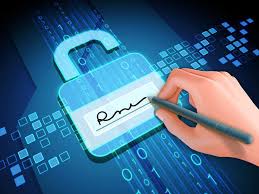Legal aspects of using an electronic signature
Introduction
In the modern world of digital technologies, electronic signatures are becoming an important tool for ensuring the legal significance of electronic documents. The use of electronic signatures greatly simplifies the processes of signing and exchanging documents, making them faster and more convenient. However, the effective use of electronic signatures requires clear legislative regulation to ensure their legitimacy and protect the rights of participants in electronic document flow. This article discusses the legal aspects of using electronic signatures in Ukraine and analyzes the relevant legislation.
The main part
1. Definition of an electronic signature
The Law of Ukraine "On Electronic Trust Services" (2017) provides a clear definition of an electronic signature. According to this law, an electronic signature is data in electronic form that is attached to other electronic data or logically related to them and used by the signatory for signing. The Law also distinguishes between a simple electronic signature, an advanced electronic signature and a qualified electronic signature, each of which has its own level of legal significance and requirements for use.
2. Legal status of an electronic signature
2.1 Simple electronic signature
A simple electronic signature can be used to sign electronic documents, but its legal effect is limited. Usually, a simple electronic signature is used in cases where there are no high requirements for the security and authenticity of the signature.
2.2 Advanced electronic signature
An advanced electronic signature provides a higher level of security and authenticity. It is created using tools that allow you to identify the signer and detect any changes in the signed data. In Ukraine, an advanced electronic signature is equivalent to a handwritten signature if it meets the established requirements.
2.3 Qualified electronic signature
A qualified electronic signature is the highest level of electronic signature in Ukraine. It is created using qualified electronic signature tools and is based on a qualified public key certificate. Ukrainian legislation recognizes a qualified electronic signature as equivalent to a handwritten signature on paper, which ensures its full legal force in all cases. You may be interested in the following articles: legal advice, legal advice, document analysis, legal analysis of the situation, written advice, verification of documents by a lawyer, lawyers documents, online legal assistance, online lawyer, legal opinion, legal opinion of a lawyer, lawyer online.
3. Regulation of electronic signatures in Ukraine
3.1 Legal framework
The main regulatory act governing the use of electronic signatures in Ukraine is the Law of Ukraine "On Electronic Trust Services". This law sets out requirements for the provision of trust services, including the creation, verification and storage of electronic signatures. It also defines the procedure for accreditation of trust service providers and the principles of their activities.
3.2 Regulatory requirements
To ensure the legitimacy of an electronic signature, certain regulatory requirements must be met. This includes the use of certified electronic signature tools, compliance with accreditation procedures and regular audits of trust service providers. In addition, the law provides for liability for violations of the requirements for the use and storage of electronic signatures.
3.3 International recognition
Ukraine is part of the global process of harmonizing electronic signature legislation. The Law of Ukraine "On Electronic Trust Services" is based on the European eIDAS (Electronic Identification and Trust Services) regulation, which facilitates international recognition of Ukrainian electronic signatures. This means that qualified electronic signatures created according to Ukrainian standards are recognized in the European Union and other countries that have implemented similar regulations.
4. Practical application of electronic signature
4.1 Electronic document management
An electronic signature is a key element in electronic document management systems. It allows businesses, government agencies, and individuals to enter into contracts, submit reports, and exchange documents without the need for physical presence. This significantly increases the efficiency and speed of business processes.
4.2 E-commerce
In e-commerce, an electronic signature ensures the legal significance of transactions and creates an additional level of security for buyers and sellers. It allows you to make deals, sign contracts, and confirm orders, which contributes to the development of online commerce.
4.3 Public services
The use of electronic signatures in public services greatly simplifies the interaction of citizens with government agencies. For example, filing tax returns, receiving administrative services, and registering a business can be done electronically with an electronic signature, which reduces bureaucratic barriers and increases convenience for citizens.
Conclusion.
An electronic signature is an important tool in today's digital world, ensuring the legal significance of electronic documents and simplifying business processes. Ukrainian legislation, in particular the Law on Electronic Trust Services, creates a reliable legal framework for the use of electronic signatures by setting requirements for their creation, verification and storage.
The distinction between simple, advanced, and qualified electronic signatures allows for different levels of security and authenticity, which is necessary for different applications. International recognition of Ukrainian electronic signatures facilitates Ukraine's integration into the global digital space.
The practical use of electronic signatures in the areas of electronic document management, e-commerce and public services demonstrates their effectiveness and importance. With the development of technology and further improvement of legislation, electronic signatures will become an increasingly important element of Ukraine's digital economy, contributing to the transparency, convenience and security of various processes.

































